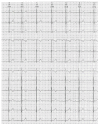Atrioventricular Block in Celiac Disease: An Unusual Clinical Presentation in a Child. A Case-Based Review
- PMID: 36360355
- PMCID: PMC9688162
- DOI: 10.3390/children9111627
Atrioventricular Block in Celiac Disease: An Unusual Clinical Presentation in a Child. A Case-Based Review
Abstract
Congenital or acquired atrioventricular block (AVB) is a rare disorder in the pediatric population, while celiac disease (CeD) is a common multisystemic autoimmune disorder that is characterized by intestinal manifestations as they are the typical clinical presentation. Sometimes CeD presents more complex multisystemic involvement which includes the heart. Cardiac involvement, such as dilated cardiomyopathy, myocarditis or conduction disease, have been mainly described in untreated adult patients with or without gastro-intestinal symptoms; rare cases of AVB and CeD have been also reported, particularly in association with extra-cardiac manifestations. We describe a case of a progressive acquired AVB block in a 4-year-old child, in which CeD was later diagnosed. A rapid and significantly improvement of the AVB grade has been obtained after the child started a strict gluten-free diet, and so we suggest including diagnostic exams for CeD in all of the children with acquired AVB.
Keywords: atrioventricular block; cardiac involvement; celiac disease; children; conduction disorders.
Conflict of interest statement
The authors declare no conflict of interest.
Figures




References
-
- Pinto-Sanchez M.I., Silvester J.A., Lebwohl B., Leffler D.A., Anderson R.P., Therrien A., Kelly C.P., Verdu E.F. Society for the Study of Celiac Disease position statement on gaps and opportunities in coeliac disease. Nat. Rev. Gastroenterol. Hepatol. 2021;18:875–884. doi: 10.1038/s41575-021-00511-8. - DOI - PMC - PubMed

